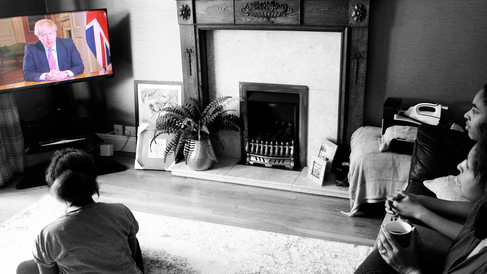Authority in Coronavirus: Policing by Consent, or Coercion?

The country stands still and the majority of the population remain behind closed doors in a bid to curtail the spread of the coronavirus.
Zak Macklin, Downing College
Facilitated by interactions between the Government authorities and the population, a society predicated on personal freedom has sacrificed a number of activities on a scale comparable to that of Orwellian fiction.
How this drastic shift occurred is a question which I have pondered over since I first learned of the draconian measures introduced in places such as Wuhan. Why is it that we have submitted ourselves to such stringent regulations that forbid the most basic activities? The question of whether such ‘lockdown’ measures were needed or not is not one which I will consider. However, analysing theories of how we might view power and power dynamics in relation to the current pandemic may offer us a view as to whether people are following ‘lockdown’ for the sake of respecting authority (‘policing by consent’), another motive perhaps overlooked, or even because of coercive behaviour.
If we refer to such restrictions in relation to realism (individual actions between actors create power structures), the concept of ‘policing by consent’ is perhaps easier to understand in more “normal” times. For the most part, people will have limited interactions with the authorities and their control will almost certainly not enter their private sphere. Thus, people will generally respect the status of the authorities as their power will not concern the most part of their lives. In the current situation, however, the authorities are reaching far beyond our front doors.
Applying realist ideology to our current situation, we can understand that interactions are creating a structure of power that is much more visible than it ordinarily would be. Each day, we are “asked” to remain at home by the Prime Minister and this is enforced by the authorities. This action is not necessarily an illustration of power: people can (and some do) choose to ignore it. The persistence of the public in their following of restrictions is the illustration of power dynamics: in realist terms, the ability to exert influence over another is why we are remaining at home. This mechanism is perhaps most often disguised in functionalist and organic analogies in that we are expected to play our part in overcoming this disease: something often proclaimed by the Government.
Adopting a more materialist view, we might presume that pre-existing power structures are the reason as to why we are following such restrictions. Unlimited fines and other penalties that were recently unveiled by police authorities might be one element to consider: when threatened with penalisation, one is more likely to abide with the initial order. Alternatively, one could consider Bourdieu’s concept of social capital which supposes that the small group in society who possess capital in the forms of knowledge are able to make informed judgements based on Government advice, or indeed issue such advice. People with less social capital may be obliged to follow ‘lockdown’ measures in a more coercive manner: their only available channel of information is currently the media – which is dominated by Government issued statistics and propaganda – and there is, thus, an even further limited opportunity for the less-privileged or less knowledgeable to make judgements. Rather, they are told information and have no real other option but to follow it.
Viewed as an example of deep-rooted power structures, this shows the hierarchical dynamics of society wherein the ‘elite’ possess the capacity to control and understand the means of power. However, irrespective of my own views, I do not think that this is a wholly useful way of analysing the pandemic; people of all backgrounds should be united in respecting what needs to be done to overcome the crisis.
Alternatively, a post-structuralist view might suggest that even in ‘lockdown’, actors still possess agency and that they follow restrictions because it is in their interests to do so. We might also consider the normalisation of behaviour that we are expected to exhibit. While this is something which ordinarily takes years to produce, the immediacy of the requests bestowed upon us have accelerated this process and we have come to accept that social distancing, and so on, is a part of daily life for the foreseeable future. When considering this power dynamic to be outside of any form of structure that may exist, poststructuralism aligns itself with the concept of ‘policing by consent’ in that we follow the regulations due to free choice and it being in our interests to do so.
Analysing power in relation to the pandemic may be useful in understanding human behaviour and power structures, and the ways out of ‘lockdown’. What is perhaps more useful is understanding what has supposedly brought a highly individualised society together in the face of adversity.
Photo "Society on Lockdown" by Keira Forde
